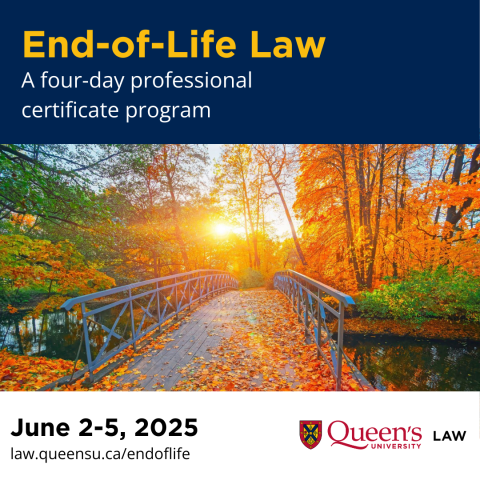
Queen’s Law has launched the End-of-Life Law Certificate, its latest program for professionals in both legal and non-legal fields. This four-day e-learning program, running from June 2 to 5, will explore the critical legal issues surrounding end-of-life planning, guided by experts in law and healthcare.
“End-of-life planning raises legal and ethical questions that affect all of us,” says Bryan Thomas, a senior research fellow at Queen’s Law and the program’s developer. “Whether making decisions for ourselves or supporting loved ones, people need current information and guidance to navigate complex issues like advance care planning, long-term care, medical assistance in dying (MAiD), and financial legacies.
“We chose this topic to equip diverse professionals with the knowledge to effectively and compassionately support clients and patients through some of life’s most difficult moments.”
Bringing theory and practice together, the certificate will give participants an in-depth understanding of key legal instruments, such as continuing powers of attorney for personal care and property management, as well as the laws and policies shaping healthcare access, MAiD, estates, insurance, funeral and burial planning, and more.
These are precisely the insights professionals need to take back to their workplaces and advance their careers with expertise in this vital and rapidly evolving legal field, notes Professor David Freedman, a wills and estates expert who will teach that session of the program. “Our population is aging, with more people reaching advanced ages than ever before. This trend is expected to continue, driving growth in this area of law.”
The program is designed to foster collaboration between lawyers and professionals in related fields. “End-of-life care is changing, and the legal issues are complex,” says Freedman. “For non-legal professionals, it’s important to understand the limits of their expertise and when legal advice is needed – and the same is true for lawyers.”
The certificate will be particularly beneficial for professionals working in government policy, non-profits, healthcare, elder care, finance and wealth management, and private legal practice.
Participants will learn from leading legal researchers at Queen’s Law, McGill University, the University of Ottawa, and other institutions, alongside healthcare and legal practitioners. In addition to Freedman and Thomas, instructors include Queen’s Law Dean Colleen M. Flood, a health law and policy expert, Queen’s Law Professor Erik Knutsen, an insurance law expert, Professor Emeritus Jocelyn Downie of Dalhousie’s law and medicine faculties, and Alexandra Manthorpe, Law’10, a partner in Cunningham Swan LLP’s wills and estates group.
“Queen’s Law offers deep expertise in areas central to end-of-life planning – health law and policy, wills and estates – and benefits from the university’s broader strengths in health sciences,” says Dean Flood. “Our commitment to interdisciplinary training and collaboration makes Queen’s an ideal place to offer accessible, practice-focused education for professionals from both legal and non-legal backgrounds.”
The program builds on the success of the AI & Law Certificate, continuing Queen’s Law’s approach to professional education. “We offer a holistic, interdisciplinary understanding of complex topics,” Flood adds. “Bringing together professionals from different fields enriches discussion, fosters collaboration, and builds the shared knowledge needed to navigate complex, real-world challenges.”
The End-of-Life Law Certificate runs online via Zoom, with active participation (camera on) required in all sessions. Participants who complete the program will receive a certificate from Queen’s Law. For Ontario lawyers, the program is eligible for Substantive Hours of Continuing Professional Development from the Law Society of Ontario.
For more information and to register, visit the Queen’s Law End-of-Life Law Certificate web page.
By Lisa Graham